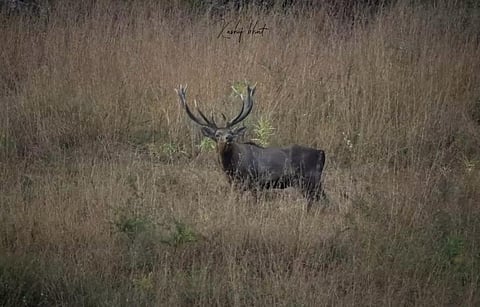

Kashif Farooq Bhat, a 24-year-old based in Srinagar, has taken on the responsibility of conservation of the hangul, a flagship stag species endemic to the Dachigam National Park. In this, he has been inspired by his family’s generational trend. Once the hunting ground of the Maharaja of Jammu and Kashmir, Dachigam was a wildlife sanctuary, before being made into a national park in 1981. The park is spread over 141 square kilometres.
“Protecting the hangul in Dachigam has always been my family’s legacy. Both my paternal and maternal grandfathers were involved in it. With over 30 years of service, my father is still into it,” Kashif, who resides about a kilometre away from Dachigam, told Down To Earth (DTE). His maternal grandfather, the late Abdul Rahman Mir, once guarded the Dachigam landscape as a wildlife guard. For this, he was awarded with the Wildlife Service Awards in 2003 by the Sanctuary Nature Foundation. After completion of his master’s degree in wildlife sciences from Aligarh Muslim University in Uttar Pradesh, Kashif now works for the non-profit as a project leader.
Earlier, the hangul was also found in Himachal Pradesh. At present, it is found only in Kashmir and is a critically endangered species. As per the last census conducted in 2023, there are 289 individuals in Dachigam. The census is carried out after every two years. A census was conducted in March 2025, but the result is yet to be released. The hangul population may have crossed 300.
Bhat pointed out that the ongoing political instability in Kashmir has greatly impacted the hangul’s habitat which has degraded over the years. Encounters disturb the animals. Though poaching has reduced for antlers and meat, certain areas still carry a threat to the species. There is also the problem of encroachment, a threat to which many national parks across India are exposed to.
“The Bakkarwals (a nomadic pastoral community) encroach inside the Dachigam National Park from the summer till autumn. This impacts the migration pattern of the hangul. In the summer months, the animals migrate to the Upper Dachigam landscape, which is occupied by the herders for the purpose of grazing their livestock. So, there is competition for resources.”
Climate change also impacts the migration pattern of the hangul. Bhat explained that reduced and erratic snowfall in Kahmir means that snowfall does not happen till January nowadays. “Usually, it used to happen by November-December. This has altered the timing when the hangul comes down to the lower elevations in the winter. The hangul prefers altitudinal migration. Due to the late snowfall in the winters, the species usually comes down late these days.”
For water availability, Dachigam, which is the critical habitat for the hangul, depends on the alpine Marsar and the Tarsar lakes situated at an elevation of about 4000 metres. According to Bhat, the flow of the Dagwan river, which flows through Dachigam, has reduced as per historic records. Apart from the hangul, the change in the snowfall timing has altered the hibernation of the Asiatic black bear, leading to increased human-wildlife conflicts. Last year, Kashmir received less snowfall as compared to other years, Kashif pointed out.
Efforts are on to safeguard this iconic species of Kashmir. Parvaiz Wani, the Dachigam National Park wildlife warden, central division (Srinagar), explained that grass species preferred by the hangul have been planted across the park which have enriched the diet of the animals. “Palatable grass species have been planted across Dachigam through dibbling and sowing methods. The park authorities also maintain water holes and salt licks as well as provide alternative feed to hangul in the winter.
In 2022, Dachigam was evaluated by the Wildlife Institute of India under the Union Ministry of Environment, Forest and Climate Change. With a percentage of 92.97, it topped among 438 protected areas (national parks and wildlife sanctuaries) of India. Wani ruled out any poaching incident in Dachigam in the past 10 years. “The park authorities strictly emphasise on patrolling and monitoring, along with habitat management.”
Wani explained that though the hangul is endemic to Dachigam, a mountainous area, adjacent corridors and wildlife sanctuaries help protect the animal. These are the Thajwas Baltal, Overa-Aru and the Tral wildlife sanctuaries. While Overa-Aru is famous for birds, Thajwas is famous for the Himalayan brown bear and connects with Ladakh. Tral was once known for hangul, but the population there is now fragmented. Wani admitted that though there have been encounters in the past few months in the park area, there was no loss to the hangul.
Kashif’s father, Farooq Ahmad Bhat, has been associated with Dachigam for the past 20 years as a wildlife guard and range clerk. This involves office as well as field work. During a phone conversation, Ahmad Bhat recalled that his father and Kashif’s grandfather, Ghulam Muhi ud Din Bhat, passed away while in service.
“After that I was appointed in 1994 and have completed 31 years in the park,” Ahmad Bhat said. He is proud of the fact that Dachigam scored the top position among all national parks and sanctuaries in India. “The hangul isn’t found anywhere else. It is a shy animal. The Dachigam authorities are trying their best to protect the animal, but the political turmoil has its impact. After 2006, the department enhanced habitat as well as management measures.”
Ahmad Bhat has also received his share of recognition. The department of wildlife protection of Jammu and Kashmir recognised his “dedication and unwavering service” towards the management of Dachigam National Park when it was adjudged the top in India during the evaluation in 2020-2022. He was presented a certificate.
Kashif explained that community outreach programmes are the need of the hour to conserve the hangul. At the same time, there is a need to ensure if the livestock of the Bakkarwals are vaccinated to stop the spread of disease. Lastly, corridors need to be protected. “My immediate concern is the Dara conservation reserve where poaching has been a problem.”